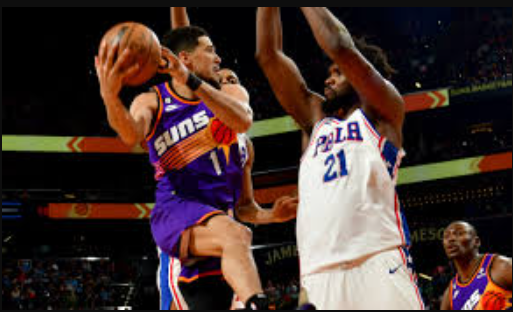“`
In a thrilling showdown between the Philadelphia 76ers and the Phoenix Suns, Phoenix asserted its dominance down the stretch, cruising to a commanding 125-105 victory. The Suns blended efficient shot-making with disciplined defense, leaving Philadelphia unable to consistently keep pace. Explore the night’s standout players, telling statistics, and decisive moments that shaped the outcome below.
Philadelphia 76ers Performance
Philadelphia fought hard but ultimately couldn’t match the Suns’ sharp play on both ends of the court. Kelly Oubre Jr., Nicolas Batum, and Tyrese Maxey contributed at key moments, but struggled to counterbalance Phoenix’s well-rounded approach.
Kelly Oubre Jr. led the Sixers with an aggressive showing: He notched 18 points in 35 minutes on 35% shooting, added five rebounds, and distributed four assists. Oubre’s energy kept Philadelphia in striking distance early, but Phoenix’s perimeter defense limited the impact of his efforts, especially in transition.
Nicolas Batum provided a steady veteran presence, recording 8 points on an efficient 75% shooting clip and going 1-for-2 from deep. He chipped in defensively with three rebounds and a steal, though Phoenix’s disciplined rotations made it tough for him and the team to generate second-chance points.
Tyrese Maxey couldn’t find his shooting rhythm, finishing just 3-of-13 from the field and 0-of-4 from beyond the arc. Despite ending with only six points, he managed to dish out seven assists and register a steal, showcasing his versatility. For a comprehensive look at Maxey’s development, check out his detailed stats.
Frontcourt spark came from Paul Reed and KJ Martin. Reed filled up the box score with 4 points and 6 rebounds in 27 minutes, while Martin brought energy on both ends, tallying 11 points and 13 rebounds. Their activity on the boards was a highlight for the Sixers.
The bench provided a scoring boost: Buddy Hield (7 points), Cameron Payne (12), Ricky Council IV (10), and Jeff Dowtin Jr. (12) all made solid contributions. Still, the reserves were unable to consistently bounce back against Phoenix’s own deep bench, facing superior ball movement and shot selection.
Phoenix Suns Performance
The Suns put together a complete team performance—featuring seamless spacing, smart ball movement, and stifling defense—to claim a statement win.
Devin Booker stole the show, scoring 29 points on 50% shooting, including a flawless 9-for-9 from the free throw line, complementing his effort with three rebounds and five assists. Booker’s blend of scoring prowess and playmaking repeatedly broke down Philadelphia’s defense. For further insight into Booker’s career trajectory, visit his player profile.
Chris Paul brought his trademark poise, delivering 13 points and seven assists while hitting 57.1% from the floor and converting all his free throws. Paul’s veteran experience was on full display, orchestrating the offense and repeatedly creating high-quality looks—hallmarks of his Hall of Fame-caliber career.
T.J. Warren chipped in 16 points on 58.3% shooting (including 50% from three), marshaling the second unit with his midrange craftsmanship and clutch defensive plays.
Anchoring the paint was Bismack Biyombo, who posted a dominant double-double with 17 points, 13 rebounds, and five blocks. His imposing rim protection deterred easy interior buckets and neutralized Philadelphia’s offensive rebounding. For more about Biyombo’s defensive reputation, see his defensive highlights.
Bench production further boosted Phoenix’s efforts. Terrence Ross (15 points) and Cameron Payne (14 points, 2-of-2 from three) delivered instant scoring and vital spacing. The reserve unit, including Jock Landale, Ish Wainright, and Darius Bazley, exhibited strong chemistry and versatility across the floor.
As a team, the Suns excelled: 50.5% shooting from the field, 46.9% from deep, and a stellar 84.2% on free throws. They controlled the glass with 45 rebounds and suffocated the Sixers with disciplined defensive closeouts—limiting Philly to sporadic scoring runs and contested shots.
Philadelphia 76ers Player Stats Breakdown
A detailed snapshot of each 76ers player’s performance in this matchup:
Phoenix Suns Player Stats Breakdown
A closer look at how the Suns distributed the scoring and drove their dominant performance:
Key Moments and Turning Points
Phoenix set an aggressive tone from the opening tip, with early shot-making from Devin Booker and Chris Paul spotting the Suns an immediate advantage. Their crisp passing and spacing created consistent open looks at the arc and in the paint.
The pivotal stretch arrived in the second quarter. With T.J. Warren and Bismack Biyombo igniting a key run, Phoenix stretched its lead. Philadelphia fell into protracted scoring droughts, especially from beyond the arc, while Phoenix punished gaps in transition and the half-court. For more on how elite ball movement unlocks offenses, see this primer from The Ringer.
After halftime, the Suns maintained composure, executing timely defensive stops and capitalizing on low turnover totals. Their bench depth, highlighted by Terrence Ross and Cameron Payne, responded to every 76ers run, while Biyombo’s rim presence sealed off late Philadelphia drives.
Conclusion
Phoenix’s 125-105 victory showcased a blueprint for sustained success: polished team offense, relentless defense, and unwavering discipline. While individual Sixers had flashes of brilliance, they struggled to match the Suns’ cohesive execution and shot-making consistency. The performance highlighted Phoenix’s depth, defensive intensity, and ability to dictate the tempo—qualities that could serve them well deeper into the season.
For Philadelphia, improving shot selection, converting open looks, and limiting wasted possessions are critical next steps. Phoenix, on the other hand, demonstrated a scalable formula built on quality spacing, steady guard play, and an intimidating paint anchor—assets that can translate against any opponent. Basketball fans interested in the latest league trends and analytics can explore ESPN NBA Stats for additional context.
Key Takeaways for Fans and Analysts
- Suns’ offensive depth: With multiple shot creators and shooters—Booker, Paul, Warren—Phoenix consistently kept the pressure on Philly’s defense.
- 76ers’ inconsistency: Cold streaks on offense and difficulties turning defensive stops into offensive runs derailed their comeback efforts.
- Defensive dominance: Biyombo’s five blocks and paint deterrence set the defensive tone, erasing many of the Sixers’ best chances at interior scoring.
- Bench advantage: Phoenix’s reserves maintained the tempo, providing essential spacing and scoring during critical stretches.
Looking Ahead: What’s Next for Both Teams?
The Suns look to carry this balanced, two-way play into their upcoming games, while the Sixers will focus on recalibrating their offense and tightening up defensive rotations. For ongoing statistical updates and in-depth analytics, the NBA’s official stats hub and Basketball-Reference provide invaluable resources for tracking team and individual performance trends all season long.
“`












